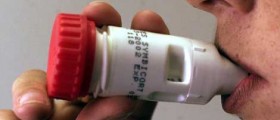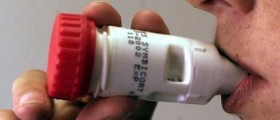
Budesonide
Budesonide is not used if one has allergic reaction to any ingredient of the medication. In acute asthma attack this medication is not supposed to be used either. And if person is prescribed mifepristone, he/she must not take budesonide.
General Side Effects
Fortunately, this medication is tolerated by majority of patients. Since budesonide is inhalation medication most of the side effects that are common to oral corticosteroids are not present when budesonide is used. A patient may complaint about exhaustion, and flu-like symptoms. It may cause viral infections, ear infection, increased body temperature, abscess and malaise. Even pain can be one side effect of budesonide.
Respiratory Side Effects
Sore throat and voice disorders such as dysphonia may occur. Respiratory infections including rhinitis, sinusitis and bronchitis are additional side effects that may happen due to budesonide. Cough is also possible.
Endocrine Side Effects
Suppression of hypothalamic-pituitary- adrenal axis is endocrine side effect of budesonide. This is a common side effect of systemic corticosteroids and it is less likely to happen when budesonide is used comparing to the usage of oral corticosteroids.
Immunologic Side Effects
Corticosteroids suppress immune system. This particularly refers to systemic corticosteroids. Still even inhalants such as budesonide can cause viral infection by immune suppression. Even today some scientist believe that inhalator corticosteroids cannot cause immune suppression while others firmly claim that even this form of corticosteroids can cause suppression of immune system leading to increased risk of infections. There are no relevant data which will confirm or rule out the potential harm of this corticosteroid.
Gastrointestinal Side Effects
Oral candidiasis and dry mouth are only two side effects of budesonide. Apart from that a patient may complain about changes in taste and nausea. Abdominal disturbances such as nausea, vomiting, diarrhea, problems with digestion, bloating, piles, and pain may be present as well. People who are suffering from Crohn's disease may experience relapse of the disease. In extreme cases one may develop gastrointestinal fistula or intestinal obstruction. Glossitis and swelling of the tongue may interfere in speech and cause difficulties with breathing.
Nervous and Psychiatric Side Effects
Most common neurological side effects of budesonide inhalation include headache, pain and asthenia. Psychiatric side effects are depression, aggressiveness, irritability and anxiety. Psychosis occurs in rare cases. Troubles with sleep and appetite may develop as well.
Hypersensitivity
Rash and contact dermatitis can be caused by budesonide. If urticaria, angioedema or bronchospams occur the drug must be discontinued.
Musculosceletal Side Effects
If budesonid is used more than a year or the person takes higher doses he/ she may develop reduction in bone density.
Cardiovascular Side Effects
The most common heart side effects are irregular heart beat, chest pain, increased blood pressure and C-reactive protein.
Metabolic Side Effects
Low level of potassium and obesity are metabolic side effects of budesonide.
Hematologic Side Effect
Increased number of leukocytes and purpura are possible.Ocular Side Effects
Inflammation of conjunctiva, problems with vision, glaucoma and cataract have been reported.
Genitourinary Side Effects
Problems with urination such as nocturia, dysuria or infections of urinary tract have been reported. Women may experience changes in menstrual period.
Dermatologic Side Effects
Skin changes most commonly include acne, alopecia, eczema and dermatitis but this occurs only if oral budesonide has been used.

















Your thoughts on this
Loading...